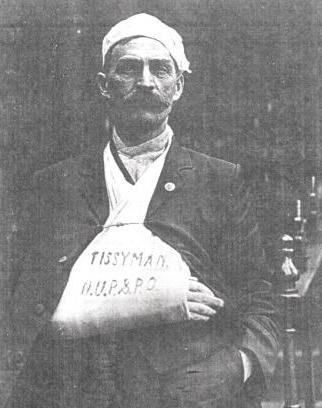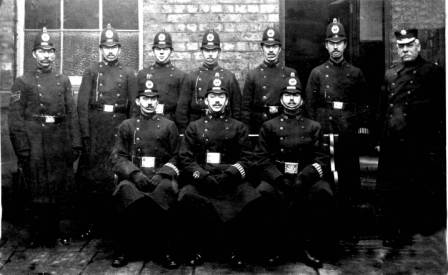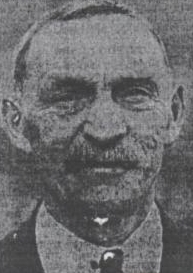SGT. ROBERT TISSYMAN by pete dellius, retired
PART I
Robert TISSYMAN
National Union of Police and Prison Officers
Robert Tissyman was a former coal miner who as a 25 year old arrived in Liverpool, probably from Yorkshire; he was born in 1869 although his early life is unknown. He joined the Liverpool City Police in October 1894. As most Liverpool City Police Officers personal records (1836 to 1950’s) were destroyed c. 1984 his early service is unknown but by 1912 he is recorded as a Police Sergeant and residing at 37 Albert Edward Road, Edge Hill, Liverpool 7. A respectable area wherein a lot of police officers resided as the district was “acceptable” to the Watch Committee; although the Police officers compelled to live in a “Respectable” area sometimes struggled to pay the rent.
As a Police Officer Robert would have taken an active part in the “Putting down” of the Liverpool Transport Strike of 1911, where no quarter was asked on either side and none given, a bitter fight which left a hatred of the Police within the ranks of the working class in Liverpool, particularly those to the left and among the unions. It must have been difficult for men such as Sergeant Tissyman, who had a hard working class background but had taken an oath to uphold the law, even though most of the Police at that time were lower paid than those on strike for more pay and better conditions.
Sergeant Tissyman and others were true to their oath and carried out their duties, the strike duly ended and Liverpool returned to some normality but the rancour persisted within the ranks of the Police and working class alike.
The National Union of Police and Prison Officers had its begining in the Metropolitan Police area of London and its history is well known and documented elsewhere, however, its growth in the Liverpool City Police can be attributed to the work of Robert Tisseyman, the tireless Liverpool leader of NUPPO and organizer of the eight Liverpool City Police branches.
He was an energetic promoter of the NUPPO ethos, who wholeheartedly believed in the “Cause” and in the working class, who he never doubted would rally around the Police in its struggle for improved pay and conditions. Time would prove his faith unfounded.
The events of the Police strike in Liverpool and its failure have been featured in many articles and books and needs no further mention in this humble effort, suffice to say it did fail and no one felt it more that Robert Tissyman who believed in the strike and the justice of the cause, he was beside himself with pity for the men he had led into battle, defeat and ultimately an unemployment wilderness.
All uniform in the hands of the strikers had to be returned to the Parade room at Rose Hill Bridewell. On the days following the strike officers attended and returned their uniforms to an ever growing pile, some just placed their uniform with the others; some threw them down in contempt. The officers on “Guard” in the room, who in the main were young recruits the older officers making themselves scarce, took some abuse. One ex “ D” Division Sergeant entered the Parade room, he was neatly dressed with his uniform neatly folded over his arm, the stripes and watch committee Long Service medal ribbons clearly in view, he placed his uniform on the pile and turning to a young officer spoke kindly to him and then left. I believe this to have been Robert Tissyman.
He must have felt betrayed by the Labour movement and Policemen who remained on duty despite being members of NUPPO and having promised compliance with the strike. It is probable that along with others he lost his “Police” house and moved elsewhere in Edge Hill as he was re-homed in the mid thirties to Huyton, his original home in Albert Edward Road still stands today (2012) so it is unlikely that he was re-homed from there.
The bold Sergeant Tissyman believed wholeheartedly in the Labour movement and championed the cause of the unemployed, he continued to campaign for the reinstatement of the dismissed officers and believed promises of reinstatement by the Labour Party when they came to power. He became involved in politics as a councillor for Edge Hill and his passion for the cause and his bitterness against the oppressors of the unemployed shone through. He was involved in most demonstrations and marches throughout the City and indeed was injured in clashes with the Police.
Robert Tissyman must have felt completely betrayed when it became apparent that Police reinstatement was never going to happen as support from the Labour Government, when they came to power, was not forthcoming not withstanding promises made.
There is a saying “ All gave some, some gave all” Robert Tissyman believed in the right of the cause so much that he led the strike from the front and withdrew from lawful duty when he had EIGHT WEEKS to his pension and knew full well the consequences of his actions. He gave all.
He died on the 15th of October 1936 at Whiston Hospital from an injury to his throat (Liverpool Echo 15-10-36).
A Measure of his fame was the heading in the Liverpool Echo on the evening of the 15th of October 1936.
MR TISSYMAN DEAD.
City Police Strike recalled
I was once in the White House public house, Berry Street/Duke Street and having an interest in the Liverpool City Police immediately noticed a “Distinguished” Gent who sported a NUPPO badge on his lapel. He spoke highly of Robert Tissyman, whom he claimed, had been his Sergeant. He made the statement “Robert Tissyman Died Bloodied but Unbowed”.
During the 1980’s I went to the Museum of Labour History held in the Lancashire Sessions House ( later an overspill Crown Court for Merseyside) On corner of William Brown Street and Commutation Row. Therein on display were the Baton, Helmet Plate and a Pocket Book of Ex Sergeant Robert Tissyman, who must have held onto them for old times sake. An awe inspiring sight.
Peter Dellius. June 2012
PART II
After the collapse of the National Police Strike in Liverpool in August 1919, Robert Tissyman, like those that had followed him, went into unemployment and in some cases poverty. Many were evicted from Police housing and could not obtain gainful employment. Robert Tissyman and other members of the Liverpool Branch of the National Union of Police and Prison Officers (NUPPO) tried to keep the Union and the hope of reinstatement alive and to such end continued to pay, where it could, strike pay and relief to the most needy.
The executive of the Union had little funds and no lawful means of gaining any other than relying on contributions which, if any, was not a lot. Those members who had remained loyal to the Police were no longer members of NUPPO and those that had gone on strike could not contribute. Any fund raising done on behalf of NUPPO was bound to come to the attention of the Liverpool City Police and it was therefore no surprise when the following appeared in the Newspaper of 26th May 1920 : –
Police Union Offices Raid
Lottery Charge at Liverpool
The headquarters of the Liverpool Branch of The Police and Prison Officers Union were Raided by Police yesterday afternoon Four Men were arrested and subsequently brought before the Stipendiary Magistrate, their names Being William Burnett SMITHWICK, 31, William SMITH, 34, Robert TISSYMAN, 51, and George Lewis BARBER, 35. The men were charged with publishing a proposal or scheme for the sale of tickets at a house in Selborne Street for an un-authorised Lottery on or about May 1st. Detective Sergeant Langford said that about noon on May 1st, in company with other officers, he raided premises in Selborne Street, which was the HQ of the National Union of Police and Prison Officers. All the defendants were found on the premises, and the warrant was read over to them, SMITHWICK replied, “You can search, but you will find nothing”
The witness afterwards searched the premises and found about 10,000 draw tickets. He also found a list with the names of the committee of the union. When charged defendants made non committal answers. Two books of counterfoils were found on SMITHWICK, together with seven postal orders amounting to 59 shillings and 6 pence (£2.92 1/2p) and also a cheque. Tickets were also found on TISSYMAN and BARBER. On the application of Mr. Roberts, the defendants were remanded for eight days, bail of £20 being allowed in each case.
——————————————————-
The NUPPO Committee in breaking the gaming laws were no doubt thinking only of keeping the Union dependants from the breadline and the solidarity of the union in order to achieve the goal of reinstatement, but in doing so many were burning bridges that could not be rebuilt.
William Smithwick and others seemed to realize the futility of hoping for reinstatement and eventually moved on, many gaining employment as licensee’s within the City, William Smithwick became a Constable in the Market Police rising to the rank of Chief Inspector, one striker became a member of the Watch Committee.
Not Bob Tissyman, a man of principle but also an obstinate man, a wrong was a wrong and had to be righted. There is within the Oxford English dictionary a phrase “Kicking against the Pricks “ This, according to that publication, means “Futile endeavour “
Ex Sergeant TISSYMAN now embarked upon a crusade on behalf of the working class unemployed of Liverpool a journey both turbulent and painful.
On the 12th of September 1921, a demonstration on behalf of the unemployed led by, amongst others, ex Sergeant Tissyman. The meeting became more and more threatening and the demonstrators demanded that St George’s Hall be opened to accommodate them and a spokesman stated “If it is not open in half an hour something will happen.” When the half hour had elapsed serious rioting broke out and hundreds made a dash on the Walker Art Gallery, the Police taken unaware were unable to stop the tide of rioter and hundreds entered the Gallery. The Police followed and on entering the Gallery locked the door behind them, a free for all ensued and 100 arrests made; several people were injured, including Robert Tissyman, the Reverend Laughland and several other leaders. The mounted Police cleared the front area of the Art Gallery. Over 150 arrests were made in total for mostly unlawful assembly
Etc.
The Police were later censured by the Recorder of Liverpool, Mr. E.G.Hemmerde KC,
His comments in part were:
“I cannot conceive any possible justification for the injuries to Rev.Laughland and Mr.Tissyman.”
“Mr. Laughland comes here with his head broken in three places, Mr.Tissyman comes with an arm broken and head smashed, and the whole evidence of the Police is that these were the two men who were preaching “NO VIOLENCE” from start to finish”
“Of course if you play with fire you cannot complain if you get burnt”
“I don’t expect the Police to behave like angels on all occasions.”
“I think most unnecessary violence was used on these men at the
Walker Art Gallery”
“I don’t want to say anything to palliate the folly of taking possession of public buildings but the Police of this town have got to realize they have no right to make their hands heavier on the public than necessary”
On November the 11th 1921, the observance of Armistice Day was marred by regrettable scenes when about two hundred men purporting to represent the unemployed disrupted the two minutes silence. They forced their way through the crowds but were halted by mounted Police and compelled to remain standing silently for the remainder of the 2 minutes silence. Later a statement was issued by the Unemployed Committee, signed by Rev. Laughland, Mr. J.Braddock and Mr. R. Tissyman, explaining that the demonstration was organized because they were so tired of the hypocrisy and inhumanity exhibited in the city. For the unemployed it would soon be the silence of the grave.
Such demonstrations continued throughout the dark days of the early twenties and Robert Tissyman was never far away. Always championing the cause of the unemployed and in particular the Police strikers.
In December 1922 a Liverpool Student named Henry Dennett, was summoned at Liverpool Police Court. He was alleged to have broken through an open air meeting and assaulted the speaker. The meeting in question was organized by the National Union of Police and Prison Officers and was being addressed by an ex Policeman named Tissyman, who was a Liverpool Police striker and had taken a prominent part in various demonstrations in the city on behalf of the unemployed. The defendant knocked Tissyman off his rostrum, shouting, “TISSYMAN IS A DAMNED COMMUNIST” He was arrested.
Severe Magisterial comment on the action of the Police was made, the Chairman of the Bench remarking that the defendant had been taken in the police wagon like a felon, placed in a cell and then certified by the police surgeon as not being drunk, as the police witness had alleged. Twelve days later he is summoned.
The bench dismissed the case, one of the Magistrates remarking that the real offender was the person making a seditious speech.
During these times, the ex Chairman of the NUPPO and ex Sergeant of the Metropolitan Police, Mr. Jack Hayes, arrived on the Liverpool scene. He had not been a striker as he was a full time executive; he had resigned from the Police to take up this post shortly before the strike. It was possibly he, on becoming the MP for Edge Hill, who advised Robert Tissyman to become involved in politics in their struggle for reinstatement of the sacked Police strikers. Both men were devout in their conviction that the strike was justified and that the Labour party would, if in power, reinstate the men.
In November 1924 Mr. Robert Tissyman was elected a Municipal Councillor for Edge Hill Ward and a turbulent time was ahead.
In July 1928 Tissyman was disruptive in a council meeting because the council had refused a miners choir permission to perform in Liverpool Parks. He would not resume his seat or be quiet and on the direction of the Lord Mayor he was led out by the Police. Mr. Luke Hogan then called on all Labour Colleagues to leave the chamber in support and this they did.
In September 1927, Tissyman made a movement to increase a payment of £5.00 (Presumably Compensation) to a woman passenger on a tramcar. It was defeated and he became disruptive and was suspended and forcibly removed from the chamber.
On 5th September 1928 there was a lively scene at a meeting of the Liverpool City Council when Councillor Robert Tissyman, a Labour member, after defying the Lord Mayor, Miss Margaret Beavan, was removed by the Police.
Mr. Tissyman refused to accept the ruling of the Lord Mayor, saying, “I HAVE BEEN SENT HERE BY THE PEOPLE, AND HERE I AM GOING TO STAY. IF YOU THINK YOU ARE GOING TO GET THROUGH YOUR YEAR OF OFFICE WITHOUT TURNING ME OUT YOU ARE MISTAKEN”
The Lord Mayor then called upon the Police and eventually he was escorted out of the Chamber by two Police Sergeants.
On September the 22nd the same year, the Liverpool Stipendiary Magistrates refused an application from Robert Tissyman, a Labour member of the City council, for a summons against a Police Sergeant for assault which, he alleged, had been committed in ejecting him from the council on September 5th.
Tissyman became the Labour member of the West Derby Board of Guardians and took part in many lively scenes at meetings of that body and in 1928 was removed by Police for defying the chair.
He resigned from Council as representative for Edge Hill but returned to the Chamber as ILP candidate and one of his first acts was to launch an attack on his former political leader. He was removed from the Labour Party and presumably lost his seat.
He made many protests about spending public money on such things as civic luncheons etc when people were unemployed and struggling to make ends meet.
He made an attempt to get back on the council, standing as an Orthodox Labourite for Abercromby ward but failed to be elected and passed from the public eye.
Robert Tissyman was a humanitarian, it is recorded that he once made a barrel organ with his own hands and gave it to a down and out in order that he could earn a living.
Despite his occasional bitterness of speech and stubborn obstinacy he made many friends.
As stated in part 1, Ex Sergeant Robert (Bob) Tissyman died on the 15th of October 1936 at Whiston Hospital from a throat injury.
Far from those hard days we now reap the benefits of the work of our forebears such as Robert Tissyman so maybe his endeavour was not futile after all.
Peter Dellius, July 2012




